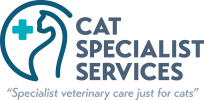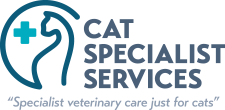Do you see hyperthyroid cats?
The new radioactive iodine unit is about to open at Cat Specialist Services in Brisbane!
Hyperthyroidism is a common endocrine disorder that affects cats and is characterised by the overproduction of thyroid hormones. If left untreated, it can lead to serious health issues such as heart problems, kidney disease, and weight loss. However, with the right treatment approach, hyperthyroidism can be effectively managed and controlled.
At Cat Specialist Services, we offer a specialised facility for the treatment of hyperthyroid cats using radioactive iodine (I-131). This highly effective treatment involves a single capsule given by mouth and is generally well tolerated by cats, with a high success rate. Most cats will achieve normal thyroid hormone levels within a few weeks of treatment.
Our facility is designed specifically to provide cats with access to natural sunlight and environmental enrichment during hospitalisation. This is important for their overall well-being while they are away from home. In addition to providing a comfortable and stress-free environment for cats, our facility has state-of-the-art equipment and is staffed by a team of experienced and compassionate specialist feline veterinarians and support staff.
The process of administering I-131 to cats begins with a thorough evaluation by one of our veterinarians, including physical examination and assessment of blood work, and possibly other diagnostic tests to determine the severity of the hyperthyroidism and to rule out any other underlying health conditions. Once a treatment plan has been established, the cat will be admitted to our facility for treatment.
After treatment cats will need to remain in isolation to allow the radioactive iodine to decay. This is a standard safety precaution by Queensland Health to protect both the cat and the people caring for them. This is typically for 5-7 days depending on the dosage of radioactive iodine that is given. During this time, cats have their own unit with plenty of space to explore, soft bedding, ramps, natural sunlight and a lovely garden view. Our staff will monitor the cat's condition closely and provide any necessary supportive care, including pain management and nutritional support.
When the isolation period is over, cats can go home with their owners. Cats need to be kept indoors for a further 2 weeks. If this is difficult to do at home, then cats can move from the radioactive iodine suite into our medical boarding suites. These suites also have natural sunlight, plenty of sleeping areas and cats can also spend time in one of three “play rooms” - we have a Harry Potter, Starwars or Lord of the Rings play rooms!
Follow-up care will be important to ensure that the cat's thyroid hormone levels remain normal and to monitor for any potential side effects. Our team will work with you to develop a plan for ongoing management and care of your cat. If you are a veterinarian and have a patient with hyperthyroidism, we encourage you to consider the benefits of radioactive iodine treatment at our specialised facility. Our team of dedicated veterinarians and support staff are committed to providing the highest quality care for your feline patients. Register your interest in this facility, as we know booking will go fast and priority will be given to the cats that have been registered earlier.


